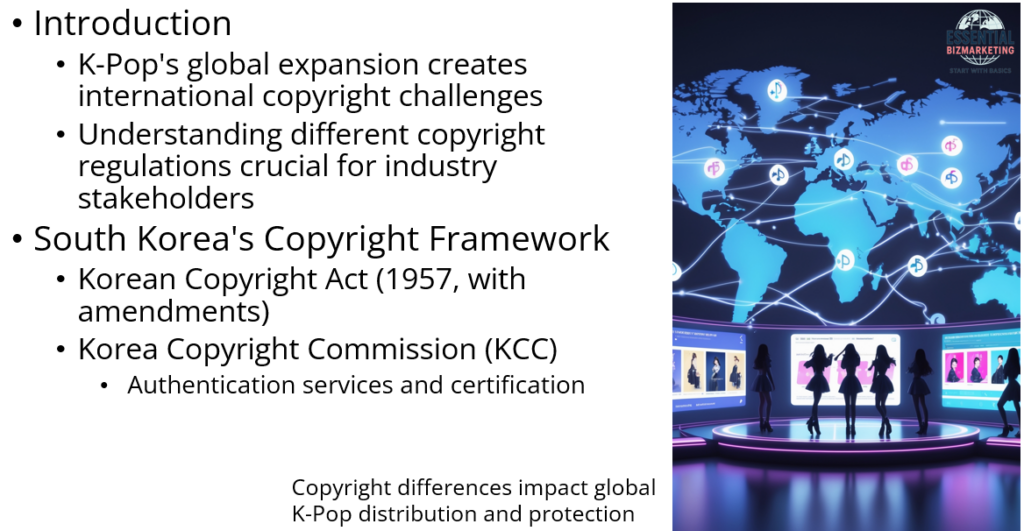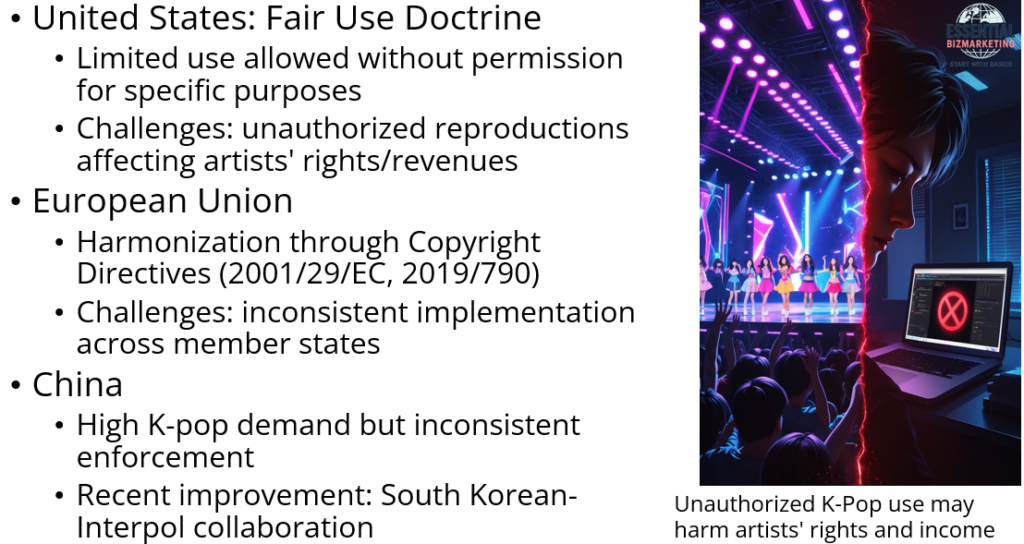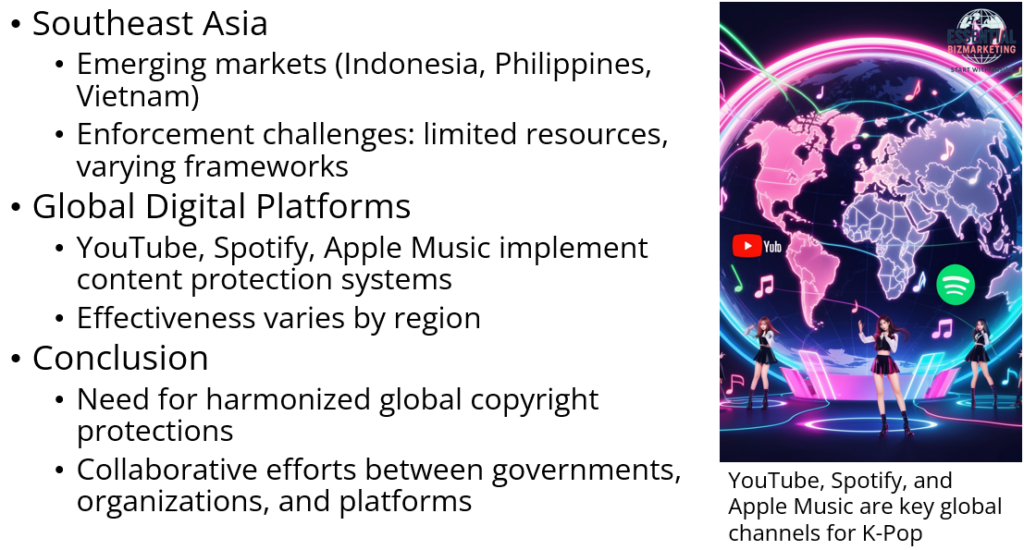Introduction: The Global Expansion of K-Pop and Copyright Challenges

K-Pop, or Korean pop music, has transformed from a regional phenomenon into a global cultural force. As K-Pop artists and their content reach audiences worldwide, the complexities of international copyright laws have become increasingly significant. Understanding how different countries’ copyright regulations affect the distribution and protection of K-Pop music and videos is crucial for stakeholders in the entertainment industry.
South Korea’s Robust Copyright Framework
South Korea has established a comprehensive copyright system to protect its creative industries. The Korean Copyright Act, first enacted in 1957, has undergone several amendments to adapt to the evolving digital landscape. The Korea Copyright Commission (KCC) plays a pivotal role in promoting legitimate use of works and developing the copyright industry. The KCC also provides copyright authentication services, issuing certificates that facilitate the protection and legitimate use of creative works.
United States: Fair Use Doctrine and Its Implications

In the United States, the Fair Use Doctrine allows limited use of copyrighted material without permission from the rights holders for purposes such as criticism, comment, news reporting, teaching, scholarship, or research. While this doctrine supports freedom of expression, it can pose challenges for K-Pop content creators aiming to control the distribution of their work. Unauthorized reproductions and adaptations of K-Pop content can lead to disputes over what constitutes fair use, affecting the artists’ rights and revenues.
European Union: Harmonization Efforts and Challenges
The European Union has made efforts to harmonize copyright laws across member states through directives like the Copyright Directive (Directive 2001/29/EC) and the more recent Digital Single Market Directive (Directive (EU) 2019/790). These directives aim to balance the rights of creators and users in the digital environment. However, variations in implementation among member states can create challenges for uniformly enforcing K-Pop copyrights across Europe. Additionally, the private copying exception in some EU countries allows individuals to make copies of legally acquired content for personal use, which can impact the control over K-Pop content distribution.
China: Enforcement Challenges Amidst High Demand
China presents a unique case with its vast market and high demand for K-Pop. Despite being a signatory to international copyright treaties, enforcement of copyright laws in China has historically been inconsistent, leading to widespread piracy. However, recent collaborations between South Korean authorities and international bodies like Interpol aim to strengthen the protection of Korean content from piracy. For instance, the Korean National Police Agency has dispatched investigators to Interpol to crack down on illegal online distribution and piracy websites, enhancing cooperation with law enforcement worldwide.
Southeast Asia: Emerging Markets with Enforcement Gaps

Southeast Asian countries such as Indonesia, the Philippines, and Vietnam have burgeoning K-Pop fan bases. However, these markets often face challenges with copyright enforcement due to limited resources and varying legal frameworks. This situation can lead to unauthorized distribution of K-Pop content, affecting the revenues of artists and entertainment companies. Efforts to strengthen copyright laws and enforcement mechanisms in these regions are ongoing, with support from international organizations and collaborations with South Korean authorities.
Global Digital Platforms: Navigating Diverse Copyright Regimes
Digital platforms like YouTube, Spotify, and Apple Music have become primary channels for K-Pop distribution worldwide. These platforms implement their own copyright enforcement mechanisms, such as Content ID systems, to detect and manage unauthorized content. However, the effectiveness of these systems varies across regions, influenced by local copyright laws and enforcement practices. K-Pop companies must navigate these diverse regimes to protect their intellectual property effectively.
Conclusion: The Need for Harmonized Global Copyright Protections
As K-Pop continues to captivate audiences globally, the need for harmonized and effective copyright protections becomes increasingly critical. While South Korea has developed a robust domestic copyright system, the international landscape presents varied challenges. Collaborative efforts between governments, international organizations, and digital platforms are essential to ensure that K-Pop artists and content creators can protect their works and receive fair compensation worldwide.
📚 References
Korea Copyright Commission. (2020). Copyright in Korea. Retrieved from https://www.copyright.or.kr/master/file/displayPdf.do?fileNo=27365
Korea.net. (2023). Ministry, police, Interpol to protect Korean content from piracy. Retrieved from https://www.korea.net/NewsFocus/Culture/view?articleId=265132
Wikipedia contributors. (2023). Copyright law of South Korea. In Wikipedia, The Free Encyclopedia. Retrieved from https://en.wikipedia.org/wiki/Copyright_law_of_South_Korea
📁 Start exploring the Blog
📘 Or learn more About this site
🧵 Or follow along on X (Twitter)
🔎 Looking for sharp perspectives on global trade and markets?
I recommend @GONOGO_Korea as a resource I trust and regularly learn from.
